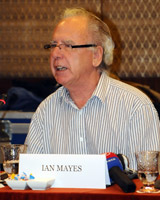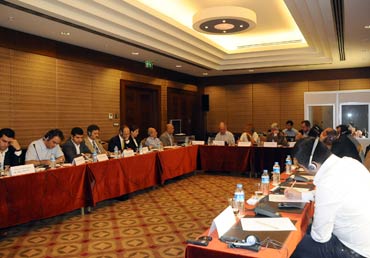Roundtable discussed media self-regulation in Turkey
30-09-2010 (Istanbul)

Ian Mayes addressing
the roundtable
© UNESCO
A group of senior Turkish journalists and international experts met in Istanbul to discuss media self-regulation and ombudsman mechanisms in a national roundtable. This meeting started the second series of events initiated by UNESCO within the framework of the project, Alignment to International Standards in the Media Sector of South-East European Countries.
The meeting was attended by three ombudsmen, who are active with dailies Hürriyet and Sabah, and the news channel NTV, as well as by a wide range of professionals, mainly from print media. In a comprehensive analysis, Ian Mayes, ex-ombudsman of the Guardian, elaborated on two themes: the role of media in democracies, and the expanded role of ombudsmen in the digital revolution.
Mayes argued that free, open and accountable media are essential elements in any real democracy; media themselves have been or are in process of being democratized; various forms of self-regulation are increasingly seen as preferable to regulation by law; and self-regulation is made more desirable by the digital revolution that is transforming all our lives.
He explained that, despite falling print figures, the Guardian had risen to the point of the second best-read paper online (after the New York Times), with almost 40 million unique users per month. This rise has to do with the global need for a credible information source, which puts a demand on corrections and constant monitoring of ethics, with soaring numbers of complaints and queries from various corners of the globe. According to Mayes, this was a developing phenomenon, which confirmed the inevitable role of ombudsmen, arguably to be called “cyber-ombudsmen”.
The second speaker, Faruk Bildirici, newly appointed readers’ representative in Hürriyet, complained about the attitude of power circles in Ankara towards the media, which are still considered to be a tool for promotion of political interests. Polarisation within the media is one of the problems, which stems from the sweeping transformation Turkey has been going through. “Some editors who are stuck in old thinking easily fall into the traps of bias,” Bildirici said. He expressed a wish for the press to be freed from all forms of threats, attempts of censorship and limitations of freedom of expression.
Professor Yasemin Inceoglu, from Galatasaray University in Istanbul, analysed the background on which the problems of self-censorship, editorial independence and relations with the powers emerge in Turkey’s widespread media. She was critical of linguistic abuses, open racism and anti-Semitism, expressions of intolerance and the overload of columnists. She also criticised the media property laws, which were obstructing diversity and fair competition in Turkey’s media landscape. According to Inceoglu, the current Press Council of Turkey is not respected by most of the press outlets, which discontinued their membership. The country media culture and vertical corporate structures are constantly reproducing resistance to external criticism, insensitivity to the readers and arrogance towards the public. “An ombudsman in such a milieu has a tough task,” she stressed.
In the following discussion, which developed into a frank dialogue between journalists and media monitors, it was argued that the Turkish press still did not rise from its bruised state, which was visible in low credibility figures, that the problems were multi-fold and chronic, and that the ongoing struggle for the honour of the profession should focus on a high-standard journalism.
During the last session Hilmi Bengi, the Chief Editor of the Anatolian News Agency (the largest of its kind in the country), informed the meeting about a new department for complaints and accountability that has recently been created. Given the fact that the agency serves the entire press in Turkey, this was welcomed as an important step.
Mayes argued that free, open and accountable media are essential elements in any real democracy; media themselves have been or are in process of being democratized; various forms of self-regulation are increasingly seen as preferable to regulation by law; and self-regulation is made more desirable by the digital revolution that is transforming all our lives.
He explained that, despite falling print figures, the Guardian had risen to the point of the second best-read paper online (after the New York Times), with almost 40 million unique users per month. This rise has to do with the global need for a credible information source, which puts a demand on corrections and constant monitoring of ethics, with soaring numbers of complaints and queries from various corners of the globe. According to Mayes, this was a developing phenomenon, which confirmed the inevitable role of ombudsmen, arguably to be called “cyber-ombudsmen”.
The second speaker, Faruk Bildirici, newly appointed readers’ representative in Hürriyet, complained about the attitude of power circles in Ankara towards the media, which are still considered to be a tool for promotion of political interests. Polarisation within the media is one of the problems, which stems from the sweeping transformation Turkey has been going through. “Some editors who are stuck in old thinking easily fall into the traps of bias,” Bildirici said. He expressed a wish for the press to be freed from all forms of threats, attempts of censorship and limitations of freedom of expression.
Professor Yasemin Inceoglu, from Galatasaray University in Istanbul, analysed the background on which the problems of self-censorship, editorial independence and relations with the powers emerge in Turkey’s widespread media. She was critical of linguistic abuses, open racism and anti-Semitism, expressions of intolerance and the overload of columnists. She also criticised the media property laws, which were obstructing diversity and fair competition in Turkey’s media landscape. According to Inceoglu, the current Press Council of Turkey is not respected by most of the press outlets, which discontinued their membership. The country media culture and vertical corporate structures are constantly reproducing resistance to external criticism, insensitivity to the readers and arrogance towards the public. “An ombudsman in such a milieu has a tough task,” she stressed.
In the following discussion, which developed into a frank dialogue between journalists and media monitors, it was argued that the Turkish press still did not rise from its bruised state, which was visible in low credibility figures, that the problems were multi-fold and chronic, and that the ongoing struggle for the honour of the profession should focus on a high-standard journalism.
During the last session Hilmi Bengi, the Chief Editor of the Anatolian News Agency (the largest of its kind in the country), informed the meeting about a new department for complaints and accountability that has recently been created. Given the fact that the agency serves the entire press in Turkey, this was welcomed as an important step.
 Participants of the roundtable
Participants of the roundtable© UNESCO
 Participants of the roundtable
Participants of the roundtable© UNESCO
Related themes/countries
· Europe and North America
· Turkey
· Professional Journalistic Standards in Europe
· Professional Journalistic Standards and Code of Ethics
Share this story:
Contact information
- UNESCO
Source














